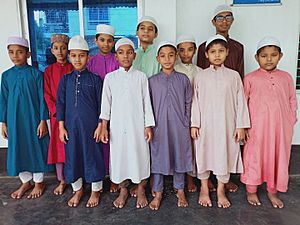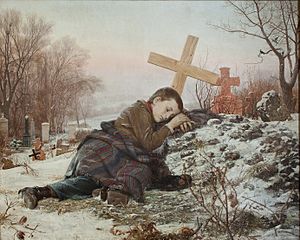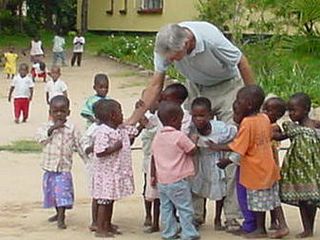Orphan facts for kids
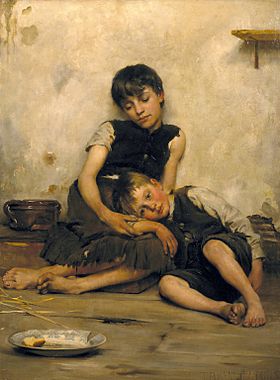
An orphan is a child whose parents have died. The word comes from the Greek word orphanós.
Usually, when we say "orphan," we mean a child who has lost both their mother and father because they passed away. But when we talk about animals, if the mother is gone, her young are often called orphans, even if the father is still around.
Contents
What Does "Orphan" Mean?
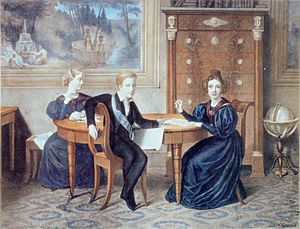
Different groups have slightly different ways of defining an orphan. For example, in the United States, a legal definition for a child who is an orphan includes those who have lost both parents due to death, disappearance, or abandonment.
While many people think of an orphan as a child with no living parents, groups like the United Nations Children's Fund (UNICEF) and Joint United Nations Programme on HIV and AIDS (UNAIDS) use a wider definition. They consider any child who has lost just one parent to be an orphan.
- A maternal orphan is a child whose mother has died.
- A paternal orphan is a child whose father has died.
- A double orphan is a child who has lost both parents.
This is different from older terms like "half-orphan," which was used for children who had lost only one parent.
Orphans Around the World
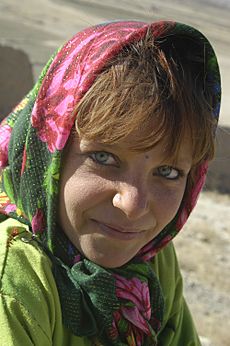
In many developed countries, it's not common for children to become orphans. Most children's parents live through their childhood. However, in countries affected by war or poverty, there are many more orphans. For example, nations like Afghanistan have a higher number of children who have lost their parents.
Here's a look at the number of orphans in different parts of the world:
| Continent | Number of orphans (in thousands) |
Orphans as percentage of all children |
|---|---|---|
| Africa | 34,294 | 11.9% |
| Asia | 65,504 | 6.5% |
| Latin America & Caribbean | 8,166 | 7.4% |
| Total | 107,964 | 7.6% |
Many orphans, especially in Africa, have lost parents due to diseases like AIDS. For example, in 2001, over 70% of orphans in Botswana had lost their parents because of AIDS.
- China: A survey in 2005 found about 573,000 orphans under 18 years old.
- Russia: In 2002, reports showed that 650,000 children lived in orphanages. When they leave at age 16, many face challenges like homelessness or trouble with the law.
- Latin America: There are many street children in Latin America, possibly as many as 40 million. Not all are orphans, but many don't have strong family support.
- United States: About 2 million children in the U.S. have lost one parent. Around 100,000 children have lost both parents.
Famous Orphans
Many well-known people throughout history were orphans. These include:
- World leaders like Aaron Burr, Andrew Jackson, and Pedro II of Brazil.
- Writers such as Edgar Allan Poe and Leo Tolstoy.
- Athletes like Aaron Hernandez.
- Artists like Henry Darger, who showed the tough conditions of his orphanage in his art.
- Entertainment stars like Louis Armstrong, Marilyn Monroe, Babe Ruth, Ray Charles, and Frances McDormand.
You can also find countless fictional orphan characters in books and comics.
History of Orphans
Throughout history, major events like Wars, widespread diseases (like AIDS), and poverty have caused many children to become orphans. For instance, after World War II (1939-1945), millions of children across Europe were left without parents due to the huge number of deaths and people moving around.
Estimates suggest there were:
- 9,000 orphans in Czechoslovakia.
- 60,000 in the Netherlands.
- 300,000 in Poland.
- 200,000 in Yugoslavia.
Many more were orphaned in the Soviet Union, Germany, Italy, China, and other places.
Orphans in Stories
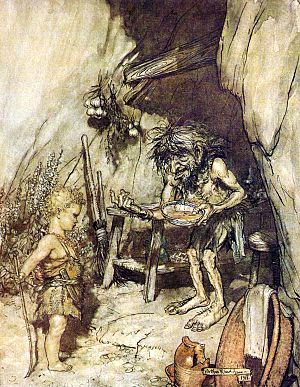
Orphaned characters are very common in stories, especially in children's books and fantasy literature. Authors often choose orphans as main characters because:
- Without parents, these characters are free to have more exciting and adventurous lives. They don't have family duties or rules holding them back.
- Orphans often become thoughtful and look for love and understanding.
- They might search for who they are by trying to learn about their family roots.
- Removing parents makes the character's challenges harder, which makes the story more dramatic.
- Sometimes, parents aren't important to the story's main idea, so making the character an orphan simplifies the plot.
These reasons make orphans appealing characters for writers.
Orphans appear often in fairy tales, like many versions of Cinderella.
Many famous authors have written books about orphans:
- Charlotte Brontë's Jane Eyre
- Charles Dickens's Oliver Twist
- Mark Twain's Tom Sawyer and Huckleberry Finn
- L. M. Montgomery's Anne of Green Gables
- J. R. R. Tolkien's The Lord of the Rings
More recent authors like Lemony Snicket, Roald Dahl, and J. K. Rowling (who wrote about Harry Potter) also feature orphans as main characters. A common story idea is the special bond an orphan can form with an adult who isn't part of their immediate family, as seen in Lyle Kessler's play Orphans.
Orphans are also very popular in comic books. Many well-known superheroes are orphans, including Superman, Batman, Spider-Man, Robin, The Flash, Captain Marvel, Captain America, and Green Arrow. Many villains are also orphans, such as Bane, Catwoman, and Magneto. Even characters like Lex Luthor and Deadpool lost one or both parents.
Orphans in Religious Texts
Many religious books, including the Bible and the Quran, teach that helping and protecting orphans is very important and pleasing to God. Important religious leaders like Moses and Muhammad were orphans when they were children.
Here are some examples of how religious texts talk about treating orphans:
Bible
- "Do not take advantage of a widow or an orphan." (Hebrew Bible, Exodus 22:22)
- "Be joyful at your festival—you, your sons and daughters, your male and female servants, and the Levites, the foreigners, the fatherless and the widows who live in your towns".(Hebrew Bible, Book of Deuteronomy 16:14)
- "Leave your orphans; I will protect their lives. Your widows too can trust in me." (Hebrew Bible, Jeremiah 49:11)
- "To judge the fatherless and the oppressed, that the man of the earth may no more oppress." (Hebrew Bible, Psalms 10:18)
- "I will not leave you as orphans; I will come to you." (New Testament, John 14:18)
- "Religion that God our Father accepts as pure and faultless is this: to look after orphans and widows in their distress and to keep oneself from being polluted by the world." (New Testament, James 1:27)
Quran
- "And they feed, for the love of God, the indigent, the orphan, and the captive," - (The Quran, The Human: 8)
- "Therefore, treat not the orphan with harshness," (The Quran, The Morning Hours: 9)
- "Have you not seen those who deny the faith and the Day of Judgment? Those are people who drive orphans away harshly, and do not encourage feeding the indigent. So woe be upon those who do prayer but are neglectful of it or show it off out of vanity, and those who deny even small kindnesses to others." - (The Quran, Small Kindnesses: 1-7)
- "(Be good to) orphans and the very poor. And speak good words to people." (The Quran, The Heifer: 83)
- "…They will ask you about the property of orphans. Say, 'Managing it in their best interests is best'. If you mix your property with theirs, they are your brothers…" (The Quran, The Heifer: 220)
- "Give orphans their property, and do not substitute bad things for good. Do not assimilate their property into your own. Doing that is a serious crime." (The Quran, The Women: 2)
- "Keep a close check on orphans until they reach a marriageable age, then if you perceive that they have sound judgement hand over their property to them..." (The Quran, The Women: 6)
See also
 In Spanish: Orfandad para niños
In Spanish: Orfandad para niños
- Adoption
- AIDS orphan
- Child abandonment
- Foster care
- Legitimacy (family law)
- Orphan Train
- Orphanage
- Street children
- Empower Orphans
- Euro-orphan
 | William Lucy |
 | Charles Hayes |
 | Cleveland Robinson |


